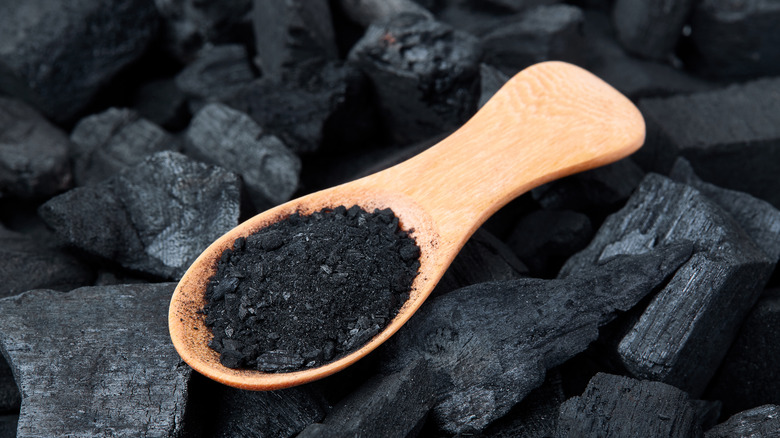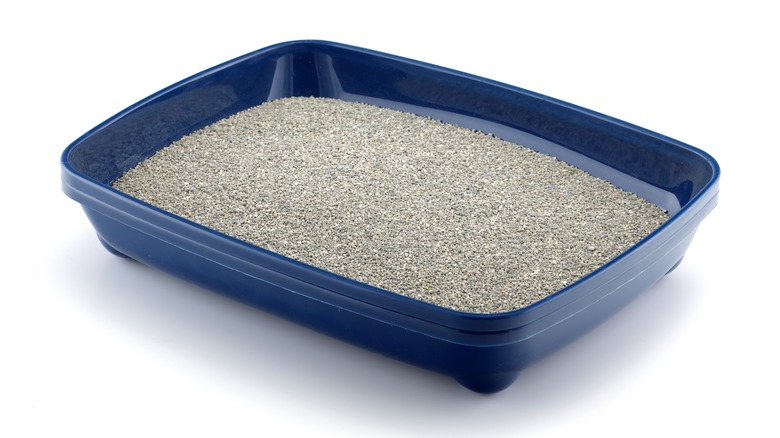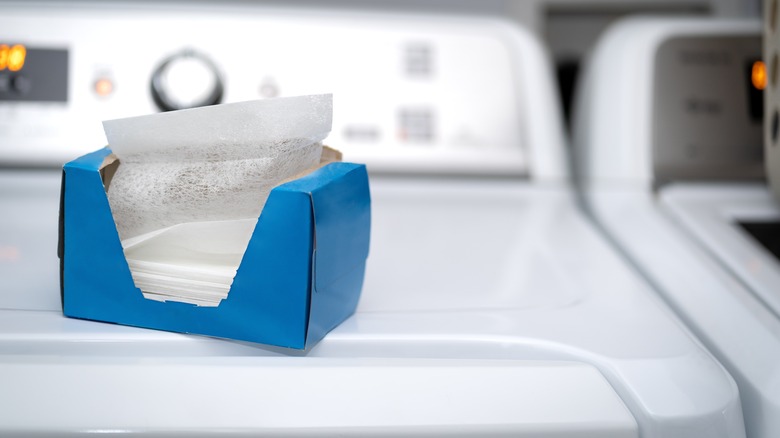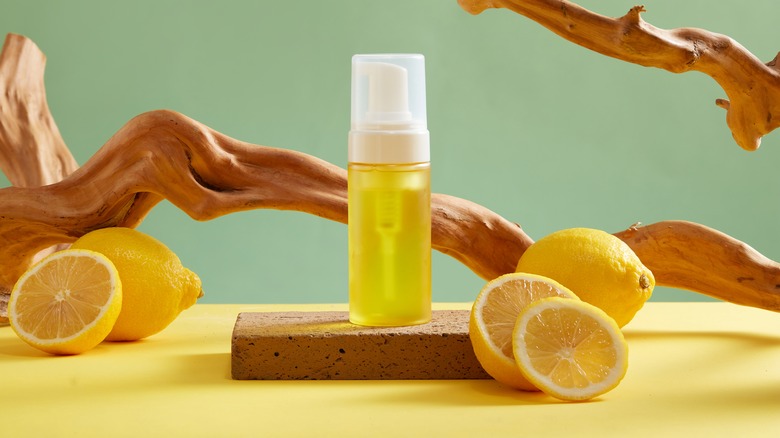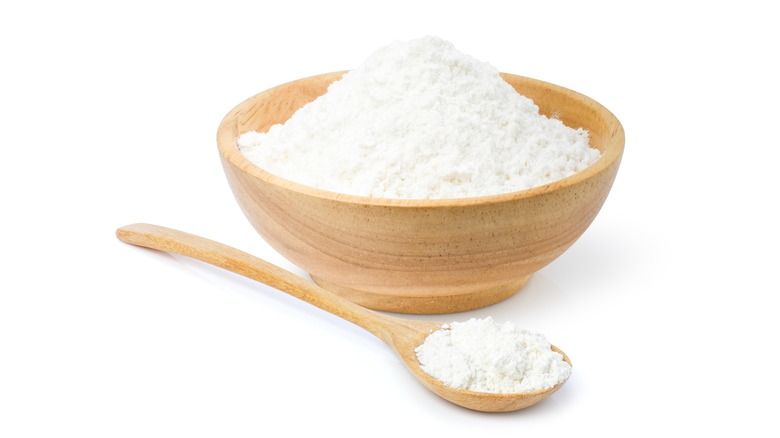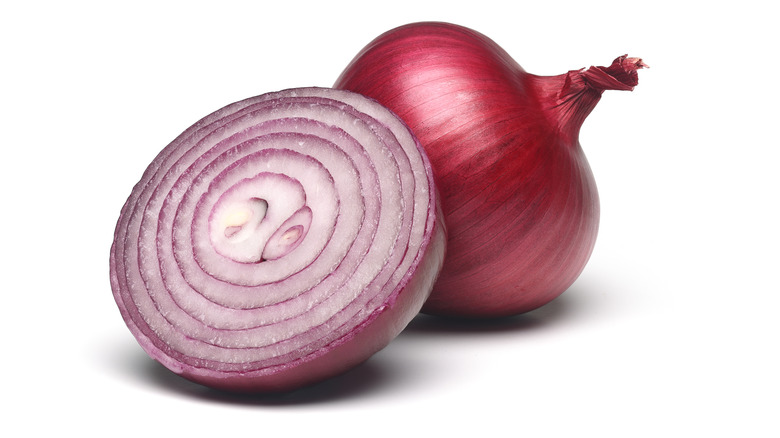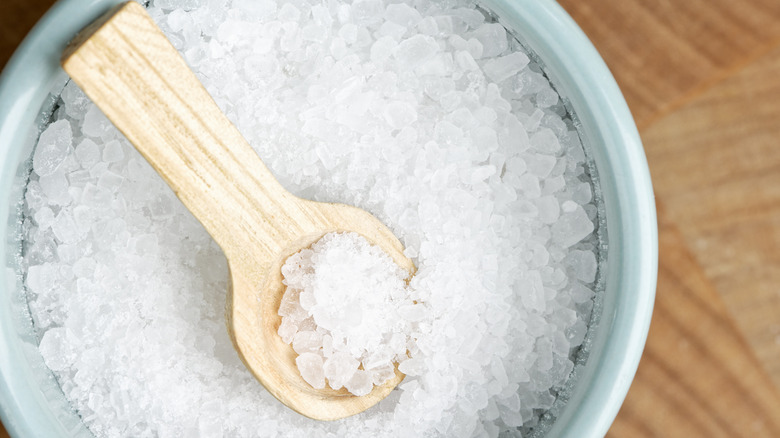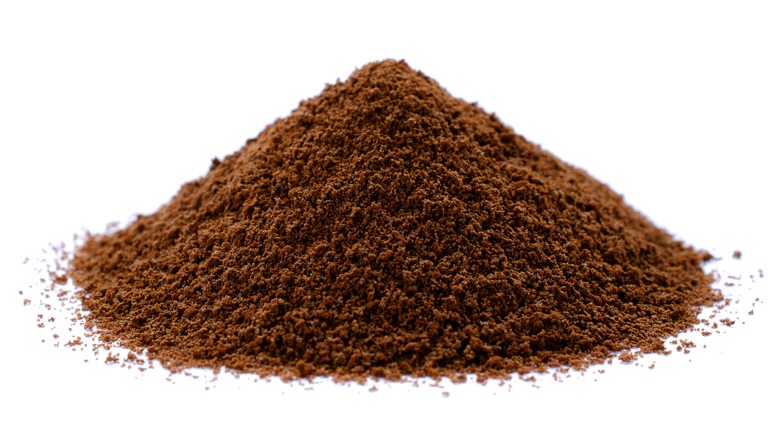10 Ways To Deodorize Your Musty Basement That Work Like Magic
Basements can provide much-needed extra storage (and living) space, but in some cases, they can also be great for collecting bad smells. Because basements are by definition built below the ground, they tend to be cooler and damper than other rooms, making them more susceptible to mold and mildew and, as a result, stinky smells. While it may seem like basement funk is here to stay, that doesn't have to be the case.
There are quite a few things you can do to combat bad smells in your basement, many of them with items you may already have in your home. Additionally, you won't have to devote much of your free time to implementing these tips and tricks. While some of these hacks are backed by scientific explanations, others have been tried, tested, and proved by homemakers and influencers alike. Let's look at simple ways you can deodorize your basement.
Chase the funk away with charcoal
Grilling on a nice summer day is probably the first thing that comes to mind when you think of charcoal. However, charcoal can also be a great tool for eliminating the lingering stink in your basement. Simply place an open bag of charcoal in your basement and let it work its magic. You should start seeing (or sniffing) results within six hours of putting the charcoal in your basement. Please note that activated charcoal works best. Experts like Basement Systems recommend changing the bag every six months.
Because charcoal is very porous, it can absorb the molecules in the air that are causing bad odors. This means that the charcoal can effectively remove the smell in your basement as opposed to just covering it up. Another bonus is that this method is safe to use in homes with pets and children, and it also won't have any adverse effects on pregnant people.
Cat litter to the rescue
If you're a cat parent, you likely already know how effective cat litter can be at keeping your pet's unpleasant smells to a minimum. Did you know it can also have the same effect in your basement? That's right! All you need to do is put several open containers of cat litter around your basement. Remember you'll need to replace the litter regularly to keep bad smells at bay.
Because cat litter is mostly made of clay, which is very porous, it can quickly and easily absorb odors, similar to how charcoal can. This is an excellent option for people who have cats because they likely already have some kitty litter in the house. However, it's still worth trying even if you don't have a cat because cat litter is relatively affordable. If you want to kick this method up a notch, you can even try using scented cat litter to bring a boost of freshness to your basement. Yes, scented cat litter.
Put your dryer sheets on double duty
For many people, using dryer sheets is a normal part of their laundry routine, but this little trick could also make them a normal part of the basement cleaning routine. There are a couple of ways you can use scented dryer sheets to freshen up your basement. The easiest is to stick a couple of dryer sheets in between the items you store in your basement. You can also put dryer sheets in your vents so that their scent will circulate around the basement.
While there doesn't appear to be any solid chemistry behind why this method works, scented dryer sheets contain pleasant fragrances that can overpower nasty smells in your basement. However, remember that if you opt to put dryer sheets in your vents, you should frequently change them to reduce the risk of fire from blocked vents and other hazards. You don't want to replace a bad smell with a catastrophic accident.
A little lemon goes a long way
Lemon is a common ingredient in many natural household cleaning concoctions thanks to its antibacterial properties. However, you may be surprised to learn that lemon has another superpower — it can also help you fight those stubborn basement scents. Combine water and lemon juice and put the mixture in a spray bottle. Then spray the solution around your basement, which should greet you with a lemon-fresh scent. Instead of squeezing lemons into water, some sources recommend creating your solution by boiling the lemons.
Not only can lemons help improve the smell in your basement, but they can also help combat the typical reasons for the odor. In addition to its antibacterial elements, lemons are also antifungal, which can help fight fungus and mildew. In addition to being very affordable, lemons are also a common staple on most grocery lists, making this trick easily accessible to many people.
Baking soda has your back
Baking soda is another household staple that can also be very helpful in your basement. In fact, you may already be using it to keep your refrigerator fresh, but you're about to find out how to use it in your basement to achieve the same effect. Grab a few bowls and fill them with baking soda. Then, place the bowls around your basement — you should notice a difference in smell within 24 hours. This time frame could be longer if your basement is extra stinky.
Baking soda's ability to fight odors is rooted in relatively simple chemistry. Baking soda is an alkaline substance, so it neutralizes acidic odors. However, while baking soda can help remove the odors, it won't replace them with a better scent, so you may want to invest in some air fresheners or combine this method with one of the others on this list.
Onions are the perfect secret weapon
Onions aren't known for being particularly fresh-smelling vegetables, so using them to get rid of bad smells may seem a little odd to most people. Despite being somewhat counterintuitive, this method usually delivers positive results. Cut an onion in half, place it in a bowl, and let it sit in your basement overnight. By the next morning, you should notice that both the funk of the basement and the smell of the onion have dissipated.
Onions can help eliminate smells because they contain a chemical called syn-propanethiol-S-oxide. Cutting onions releases this chemical, which can work to neutralize odors. If you decide to give this method a try, don't forget to remove the onion the following day. Leaving food out in your home can attract insects and other unwanted pests. Pro tip: You can also use onions to freshen up the smell in your closet.
Essential oils are here to help
Essential oils have several benefits, such as reducing stress, fighting fungal infections, and promoting good digestive health. The benefits don't stop there, though. Several essential oils, including lemon, tea tree, and eucalyptus, are capable of helping to rid your basement of that unpleasant stench. To use essential oils in your basement, mix them into a spray bottle with some water and spray the mixture around the room. Alternatively, add a few drops of your preferred essential oil to cotton balls and place them around your basement.
Because many essential oils contain antibacterial and antimicrobial properties, they work well against odors. In addition to neutralizing smells, essential oils are very fragrant and will fill your basement with much more appealing scents. If you live in a home with pets, however, this may not be the best option for you because some essential oils can be toxic to animals such as smaller cats and dogs.
Remove excess moisture with rock salt
As mentioned earlier, dampness is one of the main causes of bad-smelling basements. If you know your basement is prone to dampness, rock salt is just what you need. You can use rock salt as a dehumidifier in your basement by pouring it into a large bucket (experts recommend using a 6-gallon bucket and filling it halfway). Position a fan above the bucket, allowing the air to circulate in the room. Within a few hours, you should notice water collecting inside and outside of the bucket. You can repeat this process as often as needed until your basement feels dry. When your basement is dry, the odor should start to subside.
Rock salt is a hygroscopic substance, meaning it can remove moisture from the air. Although rock salt can help remove bad odors, it won't necessarily make your basement smell good, so you'll need to introduce some fragrances after you've taken care of the moisture. Following up with some essential oils can be a great way to introduce a better scent.
Let vodka call the shots
That bottle of vodka sitting in the back of your fridge is about to go to work like never before. This popular alcoholic beverage can also help to fight off any foul odors that may be coming from your basement. Adding vodka and water to a spray bottle will create the perfect funk-fighting combo. Mist the mixture around your basement, especially the areas that smell the worst, and the rest will take care of itself.
Due to its high alcohol content, vodka is brilliant at fighting the germs that result in stinkiness. It can also prevent these hideous germs from returning, so you won't have to worry about your basement reeking again anytime soon. If other areas of your house could use a little freshening up, you can also use vodka to remove odors from them. It's capable of leading to much more than just a hangover the next morning.
Coffee can help keep the smell away
Coffee might already be your favorite morning beverage, but it can do way more than just give you a boost of energy. Putting a bowl of ground coffee in your basement is a quick and easy way to rid your basement of that foul smell. Make sure you replace your coffee grounds with fresh ones on a regular basis and use multiple bowls if you have an especially large or musty basement.
So, what makes coffee so special that it can get you out of your morning funk — and get the funk out of your basement? The answer is actually pretty simple. The caffeine in coffee is full of nitrogen, which neutralizes air through a scientific process called absorption. When absorption occurs, nitrogen and carbon come together to absorb sulfur, which is often the cause of unwanted scents. When using this method, it's important to remember to use coffee grounds and not coffee beans.

